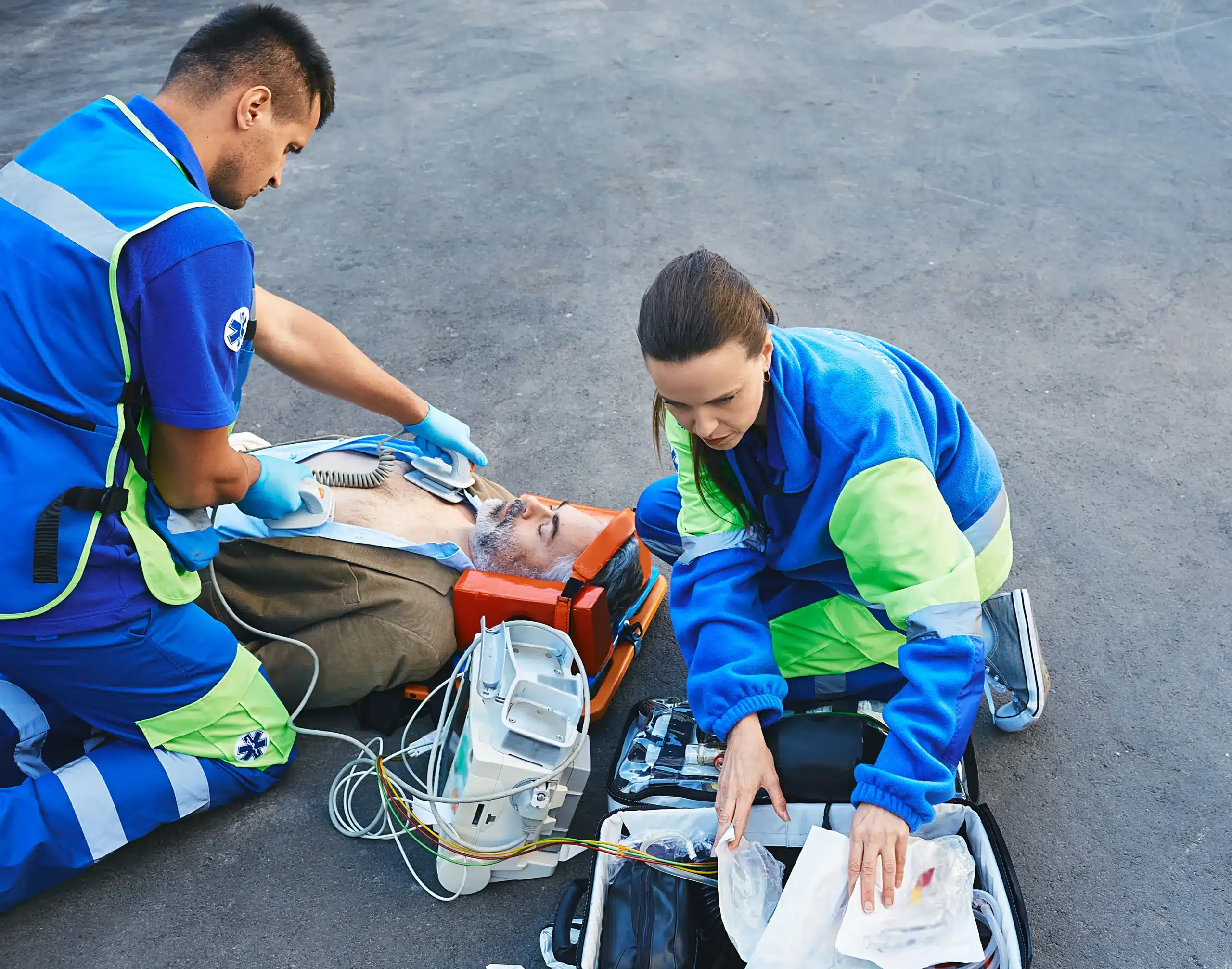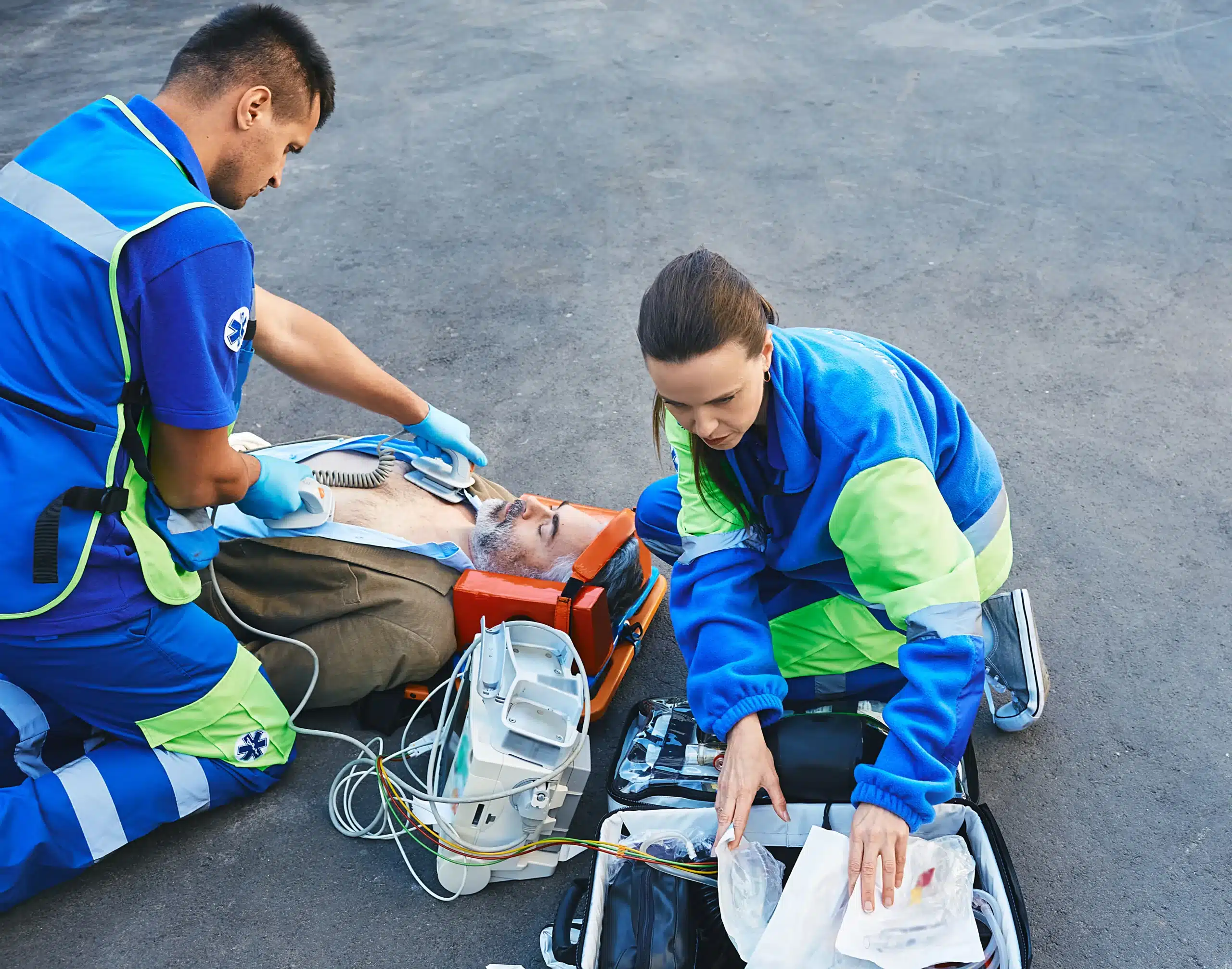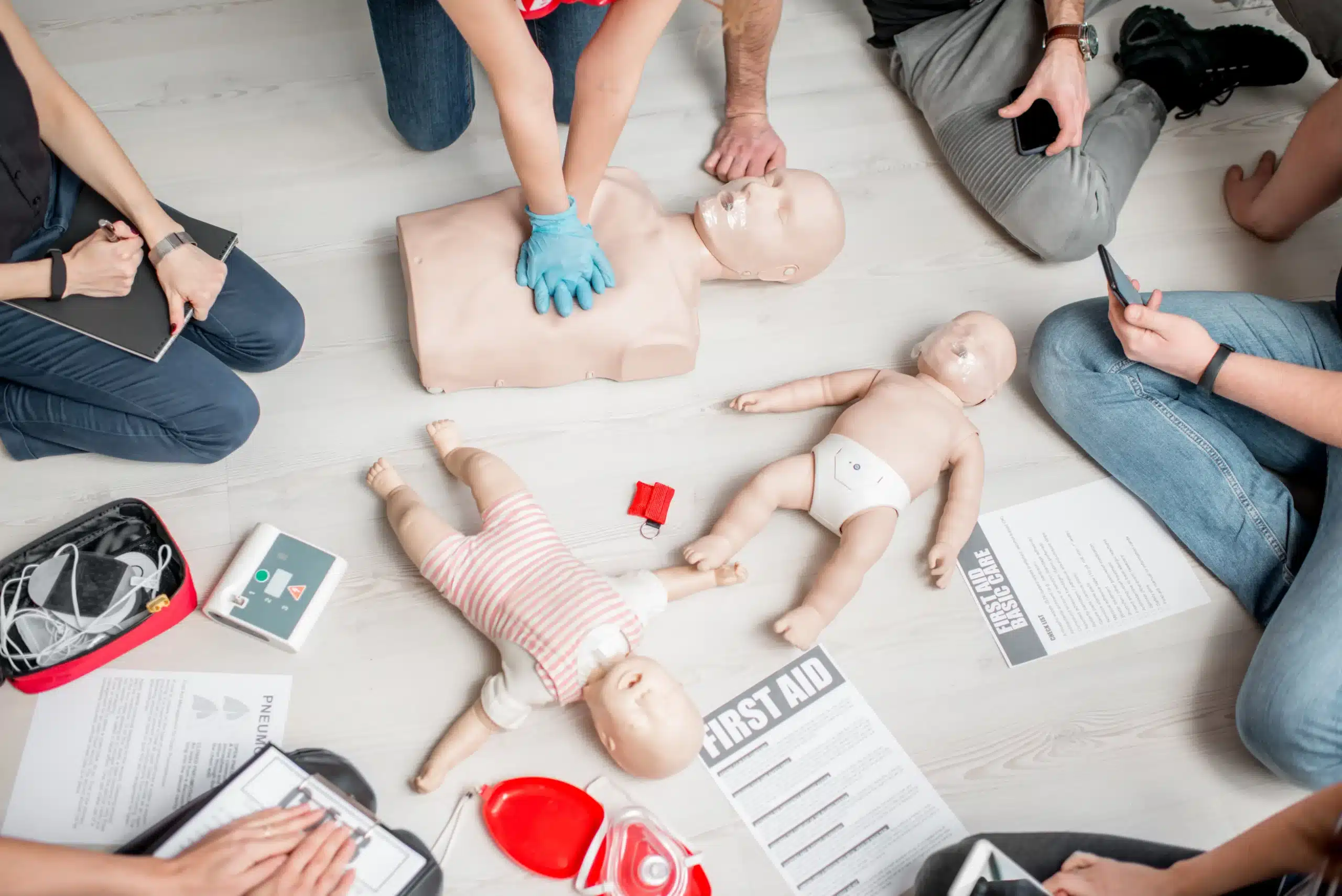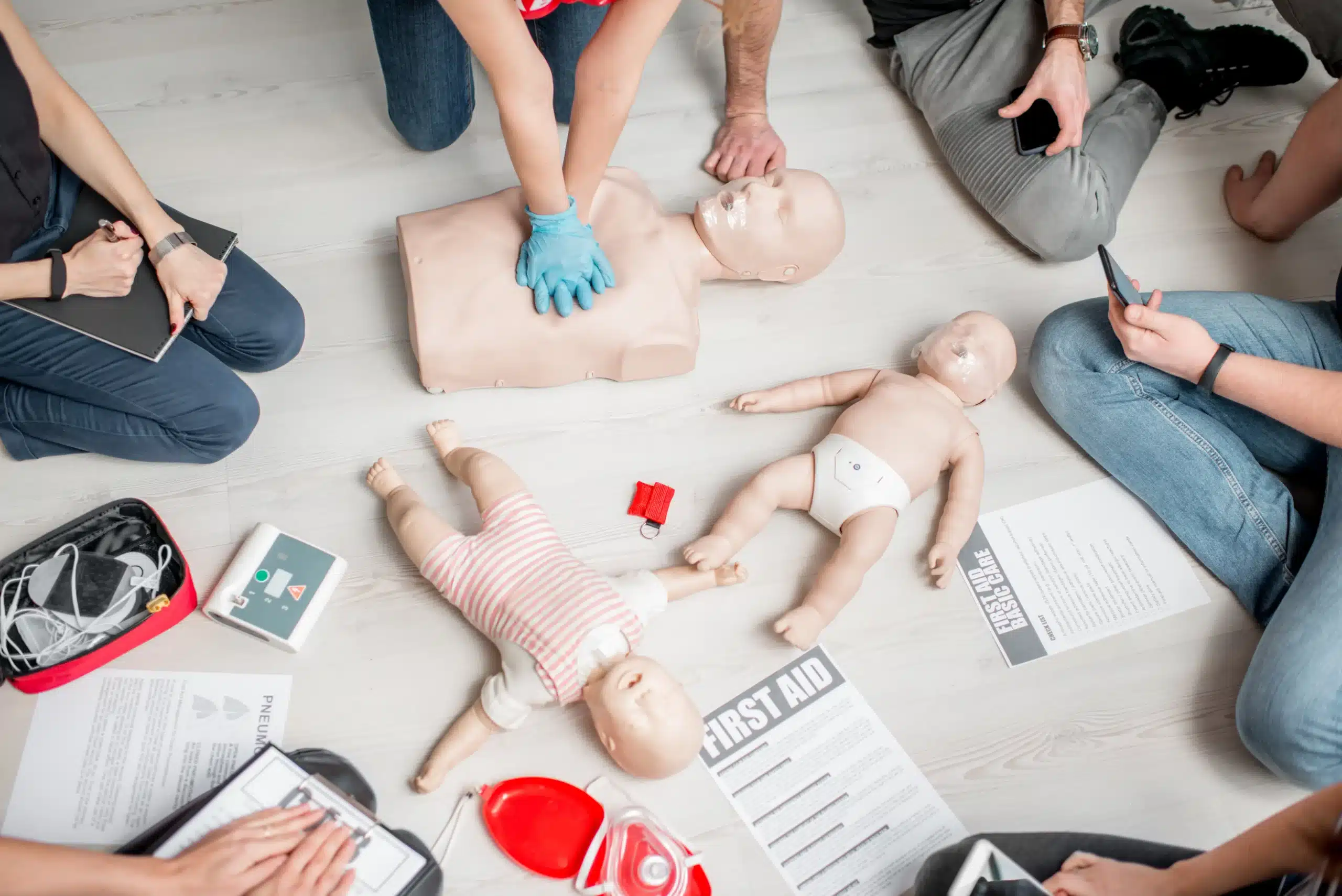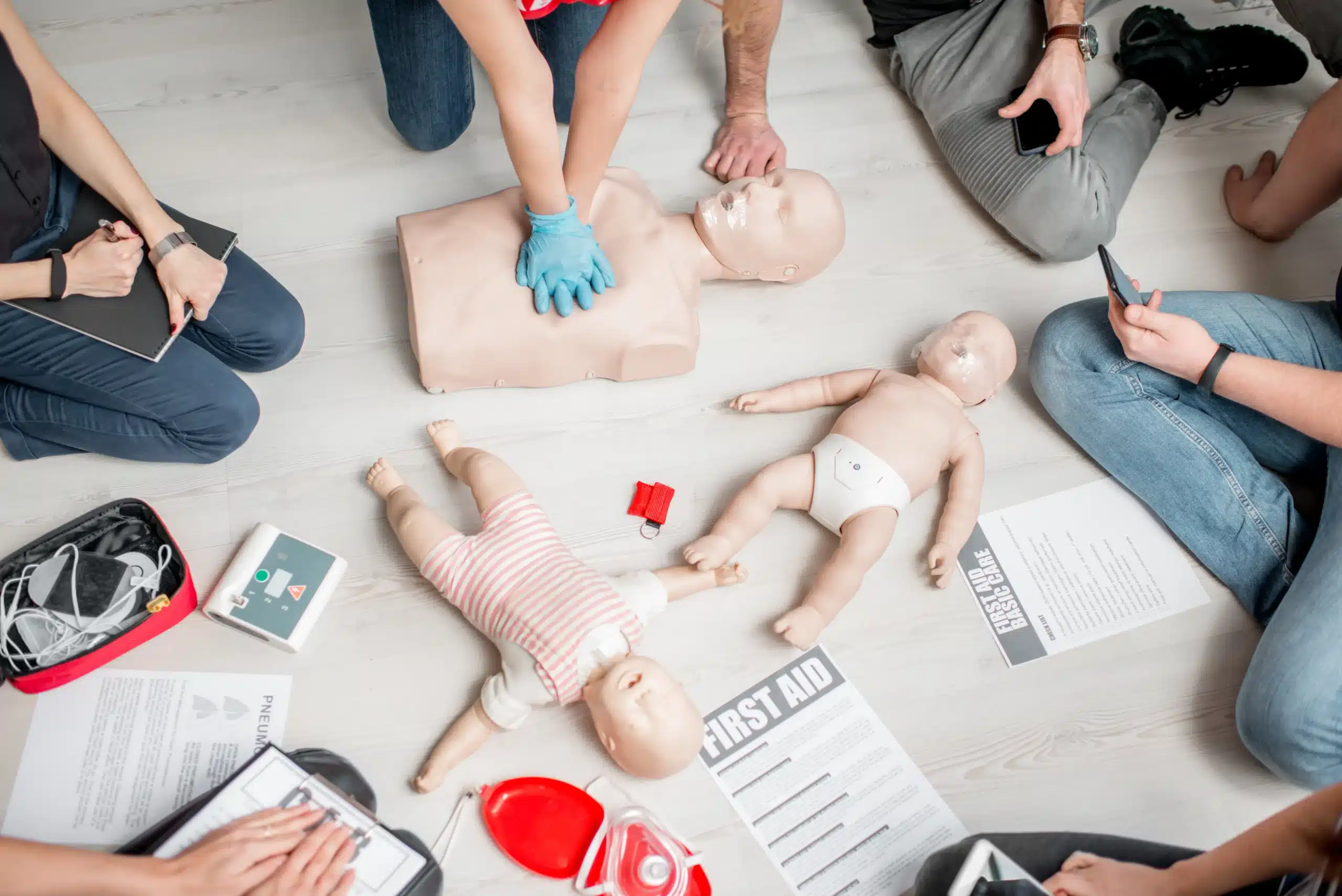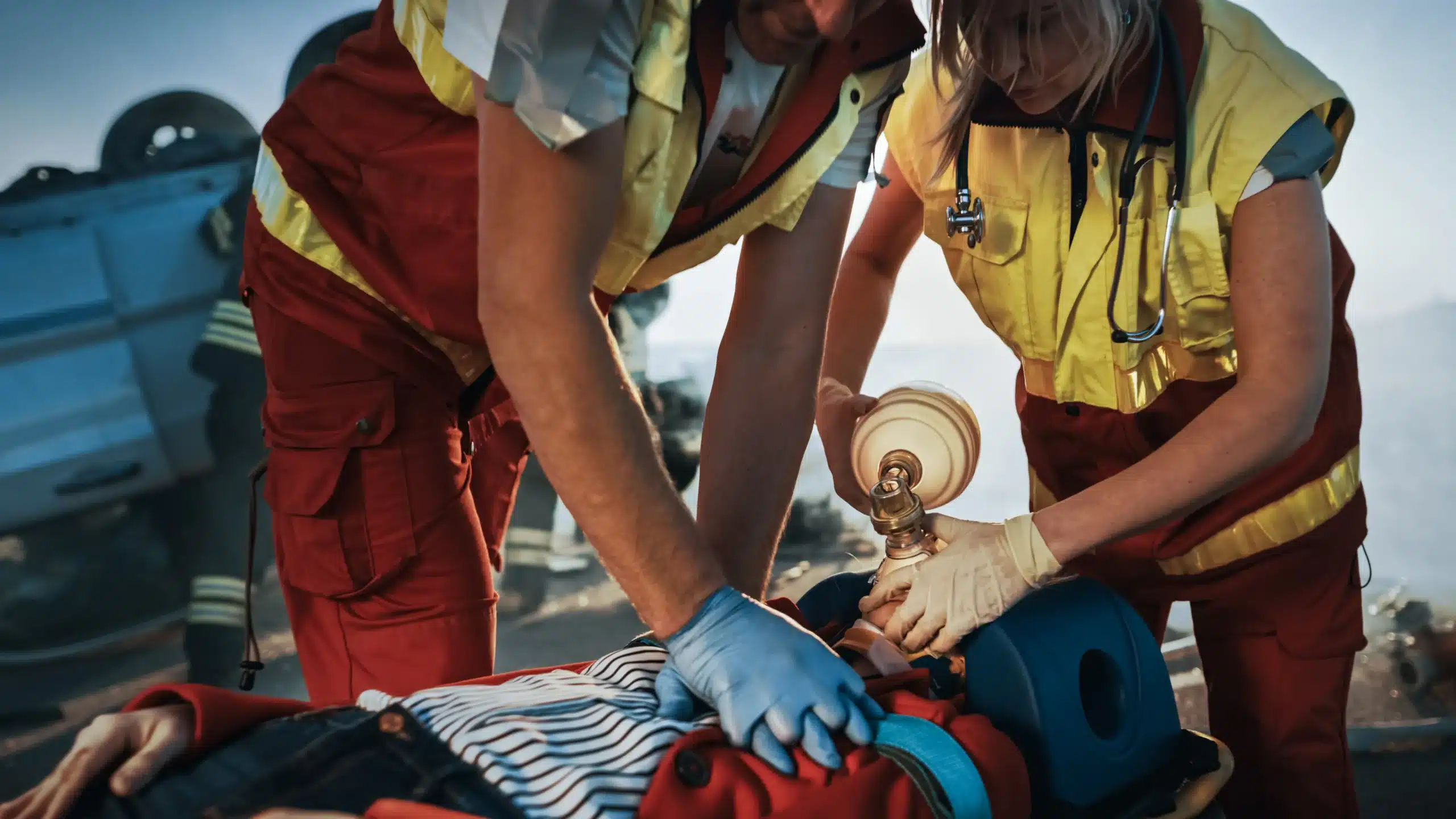Ready to empower yourself with life-saving skills? Basic Life Support (BLS) certification provides the knowledge and confidence to respond effectively in medical emergencies. This guide is your roadmap to understanding BLS, from its core components to finding the right bls courses in Concord. We’ll explore the essential skills covered in BLS training, including CPR, AED usage, and airway management, as well as the costs associated with certification and the various learning formats available. Whether you’re a healthcare provider, a student exploring career options, or simply someone who wants to be prepared for any situation, this post will help you discover the power of BLS and find the perfect course in Concord that fits your needs and schedule.
Key Takeaways
- BLS certification opens doors: Whether for career advancement or personal growth, BLS training provides essential life-saving skills applicable to various emergencies, empowering you to act confidently in critical situations.
- Choose the right BLS course: Consider factors like AHA certification, course format (in-person, online, or blended), schedule flexibility, and pricing to find the best fit for your needs. Don’t forget to explore potential discounts.
- Stay current with your BLS skills: Regular practice and recertification are key to maintaining proficiency. Refreshing your knowledge ensures you’re always prepared to deliver effective care during emergencies.
What is BLS?
Basic Life Support (BLS) is a crucial set of lifesaving skills for healthcare professionals and first responders. It covers core techniques like CPR and how to use an automated external defibrillator (AED). BLS training builds on basic CPR knowledge by adding skills specific to managing cardiac arrest, respiratory distress, and airway obstructions, making it essential for anyone working in medical or emergency response. The American Red Cross clarifies how BLS certification differs from standard CPR training, highlighting the advanced techniques included. Think of BLS as your comprehensive toolkit for various life-threatening emergencies.
While BLS training often includes CPR instruction, it also covers AED use and other advanced skills needed for effective emergency response. This well-rounded approach ensures you’re prepared to handle a range of situations. BLS certification is typically valid for two years. Regular recertification is essential for healthcare providers to maintain their skills and knowledge, which is critical for providing effective and timely care during emergencies. Staying current with the latest techniques can make all the difference.
Why Get BLS Certified?
BLS certification is a smart move for anyone working in healthcare, and it can open doors to other fields too. It shows you have the skills to handle emergencies and provide crucial care when it matters most. The American Red Cross highlights how BLS certification demonstrates valuable skills to potential employers, especially in healthcare. Whether you’re a medical student, a seasoned healthcare professional, or just starting out, this certification gives you a competitive edge.
BLS goes beyond basic CPR. It provides a deeper understanding of advanced techniques for managing cardiac arrest, respiratory distress, and airway obstructions, as explained by the American Red Cross. This comprehensive training ensures you’re prepared for a wider range of emergencies, giving you the confidence to act swiftly and effectively. The American Heart Association also stresses the importance of BLS training for healthcare providers. It’s the gold standard for ensuring you can provide the best possible care in critical moments. Plus, remember that your BLS certification is typically valid for two years, so staying current with recertification courses is key.
Find BLS Courses in Concord
Finding the right BLS course in Concord is straightforward with several excellent providers offering comprehensive training. Whether you’re a healthcare professional or want this certification for personal reasons, Concord has options for you.
Safety Training Seminars
Safety Training Seminars offers various American Heart Association (AHA) certified courses, including BLS. They focus on high-quality training for both healthcare providers and the public, preparing participants for emergencies. Their courses cover essential skills like CPR and First Aid. Serving Walnut Creek, Concord, and Pleasant Hill, their location is convenient for central Contra Costa County residents. They also offer a low price guarantee.
CPR Training Center
The CPR Training Center specializes in AHA-certified courses, including BLS, ACLS, and PALS. They serve the broader Bay Area, focusing on Concord, San Ramon, Brentwood, and surrounding areas. Their programs are designed to build confidence in handling cardiac emergencies.
Bay Area CPR
Bay Area CPR provides a range of AHA-certified courses for healthcare professionals and the community. Their BLS training is tailored to the needs of individuals in Concord and the greater Bay Area. They also offer ACLS and PALS courses.
Other Local Providers
Beyond these training centers, Concord has other local providers offering BLS courses. These providers frequently offer various learning formats, including in-person, online, and blended learning, allowing you to choose a course that fits your schedule and learning style. Whether you’re a healthcare worker or want to learn life-saving skills, you can find a suitable BLS course in Concord.
BLS Course Costs in Concord
Understanding the cost of BLS certification is an important step in choosing the right course. Pricing varies depending on the training center, whether you’re getting certified for the first time or renewing, and whether any discounts apply. Let’s break down the typical costs associated with BLS training in Concord.
New Certification Prices
For a new BLS certification, several factors influence the price. Generally, expect to pay between $70 and $100 for a new BLS certification course. Safety Training Seminars, an American Heart Association Training Center, is known for its competitive pricing and low-price guarantee in Contra Costa County. Comparing prices from different providers is always recommended to ensure you’re getting the best value.
Recertification Costs
If your BLS certification is expiring, you’ll need a recertification course. These courses are usually slightly cheaper than the initial certification. BLS certification lasts for two years, so make sure you recertify to maintain your credentials. Check with your chosen provider for their specific recertification pricing.
Discounts and Deals
Many training centers offer discounts to make BLS training more accessible. Some providers, like Bay Area CPR, offer group discounts, a great option if you’re organizing training for a group. Look out for special promotions or other offers that can help you save on your BLS training. Safety Training Seminars also offers courses in nearby Pleasant Hill, giving you more options for convenient and affordable training.
Choose Your BLS Course Format
Deciding on the right BLS course format depends on your learning style and schedule. Let’s break down the most common options: in-person, online, and blended learning. Each has its own advantages, so consider what works best for you.
In-Person Classes
In-person BLS classes offer a hands-on learning experience. You’ll practice skills like CPR and using an AED with instructors who can provide immediate feedback. This direct interaction is invaluable for building confidence and mastering the techniques. Safety Training Seminars offers AHA-certified BLS courses in Walnut Creek, providing comprehensive training and recognized certification. The in-person format allows for real-time question and answer sessions and the opportunity to learn from other students’ experiences. If you thrive in a structured, interactive environment, in-person training might be your best bet.
Online Options
Online BLS courses offer flexibility for those with busy schedules or limited access to in-person classes. You can study the material at your own pace and revisit sections as needed. The American Red Cross offers online BLS certification courses that cover essential life-saving skills. While online courses offer convenience, it’s important to note that they typically require an in-person skills session to complete the certification process. This blended approach ensures you still get the hands-on practice necessary for real-world scenarios.
Blended Learning
Blended learning combines the best of both worlds: online learning and in-person skills practice. Programs like HeartCode BLS allow you to study the theoretical material online at your convenience, then schedule a shorter in-person session to demonstrate your skills with a certified instructor. This format is particularly helpful for busy professionals or those who prefer to absorb information independently before practicing hands-on techniques. Blended learning offers a balanced approach, ensuring you have a strong theoretical foundation and the practical skills to apply it.
Learn Key BLS Skills
BLS certification equips you with the essential skills to respond to life-threatening emergencies. It goes beyond basic CPR, covering a range of techniques that can significantly improve a patient’s chances of survival. Let’s break down the core components you’ll master in a BLS course.
High-Quality CPR
High-quality CPR is the cornerstone of BLS. You’ll learn the proper techniques for chest compressions, ensuring adequate depth and rate to maintain blood circulation. BLS training emphasizes the importance of minimizing interruptions during compressions, maximizing the flow of oxygen to the brain and other vital organs. This training covers both single-rescuer and team-based CPR, preparing you to act effectively in various emergency situations. A solid understanding of high-quality CPR is fundamental to providing effective care during cardiac arrest.
AED Usage
Automated External Defibrillators (AEDs) are life-saving devices that can restore a normal heart rhythm during sudden cardiac arrest. BLS courses provide comprehensive training on how to properly use an AED. You’ll learn to quickly assess the situation, apply the AED pads correctly, and follow the device’s prompts to deliver a potentially life-saving shock. Knowing how to use an AED can dramatically increase the chances of survival for someone experiencing a cardiac emergency.
Airway Management
Effective airway management is crucial for ensuring a patient can breathe during a medical crisis. BLS training covers various techniques to open and maintain a clear airway, including head-tilt-chin-lift and jaw-thrust maneuvers. Proper airway management is a critical skill in BLS, allowing you to provide vital oxygen to a patient in need.
Team Dynamics in Resuscitation
In many emergency situations, resuscitation efforts involve a team of healthcare providers. BLS training emphasizes the importance of effective team dynamics during these critical moments. You’ll learn how to communicate clearly, coordinate tasks efficiently, and work together seamlessly to provide the best possible care. Understanding team dynamics in resuscitation is essential for optimizing patient outcomes and ensuring a coordinated response.
BLS Training: Prerequisites
Before you sign up for a Basic Life Support (BLS) class, it’s helpful to understand the requirements. While BLS certification focuses on practical skills, a few prerequisites will ensure you’re set up for success. This section covers age limits, required prior knowledge, and the course’s physical demands.
Age Requirements
There’s no official minimum age to learn BLS. The focus is on your ability to grasp the concepts and perform the physical skills. Safety Training Seminars welcomes students of all ages, whether you’re a medical professional seeking recertification or a concerned citizen wanting to learn life-saving techniques. If you’re unsure if BLS is right for you, or if you’re signing up a younger student, reach out to our team. We’re happy to answer your questions.
Prior Knowledge
You don’t need prior medical knowledge to take a BLS course. Our instructors at Safety Training Seminars design the classes to build your skills from the ground up. We cover everything from basic CPR to using an AED and recognizing the signs of a cardiac arrest. For healthcare providers who need to expand their skillset, we also offer more advanced courses like ACLS (Advanced Cardiovascular Life Support) and PALS (Pediatric Advanced Life Support).
Physical Demands
BLS training involves hands-on practice, including chest compressions and rescue breaths. This requires a certain level of physical ability. You’ll be kneeling and performing compressions for short bursts, which can put a strain on your hands, wrists, and arms. If you have any pre-existing conditions or concerns about the physical demands, talk to your doctor or contact us before your class. We’re happy to discuss modifications or answer any questions. We also offer a flexible rescheduling policy if you find the physical demands too challenging during the course.
Advance Your Healthcare Career with BLS
Getting your BLS certification is a smart move for anyone in healthcare. It opens doors to more job opportunities, builds essential skills, and gives you the confidence to handle emergencies effectively.
Job Opportunities
BLS certification is often a must-have for many healthcare jobs, especially those requiring you to respond to life-threatening situations. Employers look for this certification as a baseline qualification, giving you a real edge in a competitive job market. Whether you’re a medical student just starting out or a seasoned healthcare professional, BLS certification demonstrates you’re ready to handle critical situations. It can make a difference when applying for roles like a nurse, doctor, or emergency medical technician.
Skill Development
BLS courses teach practical, life-saving skills like CPR, using an AED, and providing first aid. These skills are fundamental in any healthcare setting. A good BLS course covers the core procedures and techniques you need, preparing you for real-world emergencies. You’ll learn how to assess a situation quickly, perform CPR effectively, and use an AED correctly. These are essential skills that can save lives.
Emergency Confidence
Beyond technical skills, a BLS course builds your confidence in handling emergencies. Studies show that training with feedback significantly improves how well people perform BLS skills, leading to better outcomes in real-life situations. Knowing you can handle a crisis calmly and effectively makes a real difference in the quality of care you provide. This confidence benefits not only you but also your patients and colleagues. It allows you to react swiftly and decisively under pressure, a crucial attribute in any healthcare role.
Select the Right BLS Provider in Concord
Finding the right BLS provider is just as important as the certification itself. With several options in Concord, how do you choose the best fit? Here’s a breakdown to help you make an informed decision.
Factors to Consider
First, confirm the courses are accredited. Look for an American Heart Association (AHA) Training Center like Safety Training Seminars. Their BLS certification courses adhere to the latest AHA guidelines, ensuring you receive high-quality, nationally recognized training. Also, consider whether the provider offers other certifications you might need, such as ACLS, PALS, or First Aid. A training center with a range of courses can be a convenient way to meet all your certification needs. Safety Training Seminars also provides specialized courses like the Neonatal Resuscitation Program (NRP) and the EMSA Child Care Health & Safety course designed for childcare providers in California.
Compare Course Features
Next, compare course features. Do class times fit your schedule? Safety Training Seminars offers classes daily, providing flexibility. Price is another key factor. While many providers advertise “low prices,” check if they have a low-price guarantee like Safety Training Seminars. If you’re training a group, ask about discounts for on-site training. This can be a cost-effective way to certify multiple team members.
Safety Training Seminars: Unique Offerings
Safety Training Seminars distinguishes itself through its commitment to student success. As a woman-owned AHA Training Center, they prioritize convenience, affordability, and exceptional customer service. They offer various courses, including BLS, ACLS, PALS, CPR, and First Aid, in nearby Pleasant Hill, a short drive from Concord. Their focus on high-quality training and customer satisfaction makes them a strong option. Explore their RQI classes and other offerings on their website.
Maintain Your BLS Skills
Once you’ve earned your BLS certification, staying up-to-date is key to providing effective care. Regularly reviewing and practicing your skills ensures you’re always prepared for an emergency.
Refresher Courses
Even if your certification is current, consider taking a refresher course. These courses reinforce essential BLS skills like high-quality CPR, using an AED, and airway management. Many organizations and training centers offer these programs to help healthcare providers maintain their proficiency. These courses often cover single-rescuer and team basic life support skills in both prehospital and in-facility environments, focusing on high-quality CPR and team dynamics. A refresher can increase your confidence and keep your skills sharp.
Updates and Recertification
BLS certification is typically valid for two years. Make sure you know when yours expires and sign up for recertification in advance. Recertification keeps your credentials current and introduces you to any updated guidelines or protocols, ensuring you’re always practicing the most effective techniques.
Practical Application in Healthcare
Regularly using your BLS skills in a clinical setting is crucial for maintaining proficiency. Studies, like this research analyzing the effects of a BLS simulation course on nursing students, show that practical application, such as simulated CPR, significantly improves learning outcomes and skill retention. Seek opportunities to apply your knowledge in real-world scenarios whenever possible. This could involve volunteering, participating in drills, or shadowing experienced professionals.
Related Articles
- BLS Certification in Pleasant Hill: Your Complete Guide – Walnut Creek CPR Classes
- BLS Renewal in Concord: Your Complete Guide – Walnut Creek CPR Classes
- BLS Courses in Walnut Creek: A Complete Guide
- CPR Training in Pleasant Hill: Your Complete Guide – Walnut Creek CPR Classes
Frequently Asked Questions
How often do I need to renew my BLS certification? BLS certification is typically valid for two years, after which you’ll need to recertify. It’s a good idea to check with your employer or certifying organization for specific requirements and plan your recertification course in advance.
What’s the difference between BLS and CPR certification? While CPR is a core component of BLS, BLS training covers a broader range of skills, including AED use and advanced airway management techniques. It provides a more comprehensive approach to emergency care, especially for healthcare professionals.
What if I have physical limitations? Can I still get BLS certified? Absolutely! While BLS involves hands-on practice, modifications can often be made to accommodate physical limitations. It’s always best to discuss any concerns with your chosen training provider beforehand. They can offer guidance and potential adjustments to the training.
Are online BLS courses accepted? Many organizations accept online BLS courses, but they often require an in-person skills assessment component. This blended approach allows for flexible online learning combined with the essential hands-on practice. Check with your employer or certifying body to ensure the online course you choose meets their requirements.
How do I choose the right BLS training provider in Concord? Look for providers offering AHA-certified courses, convenient schedules, and competitive pricing. Reading reviews and comparing course features can also help you find the best fit for your needs. Don’t hesitate to contact different providers directly and ask questions about their programs.

